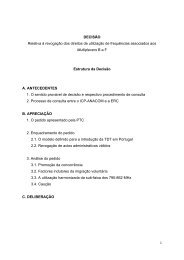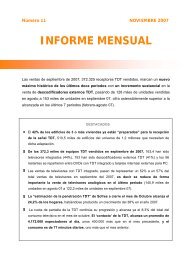The Price of Plurality - Stakeholders - Ofcom
The Price of Plurality - Stakeholders - Ofcom
The Price of Plurality - Stakeholders - Ofcom
Create successful ePaper yourself
Turn your PDF publications into a flip-book with our unique Google optimized e-Paper software.
42John Whittingdalealong with growth in broadband take-up, and with the completion <strong>of</strong>digital switchover in 2012 virtually all households in the UK will be ableto receive a wide range <strong>of</strong> these services.However, alongside this there is evidence that the existingarrangements for supporting public service content are comingunder pressure. In particular, concerns have been raised that ITV,Channel 4 and Five will reduce their provision <strong>of</strong> public servicecontent as audiences fragment and their market share declines.<strong>The</strong> pressure on the current system is already becoming obvious – forinstance, commercial broadcasters are seeking to scale back theirlevel <strong>of</strong> provision <strong>of</strong> UK-produced children’s content and regionalprogramming. In this climate, there may need to be different models<strong>of</strong> intervention and funding if viewers and listeners are to retain accessto specifi c types <strong>of</strong> public service content.A model for sustaining public service content infutureGiven these developments in communications markets, includingpressures on the traditional PSBs and the growth in market provision<strong>of</strong> public service content, it is appropriate to consider the extent towhich the traditional model <strong>of</strong> public intervention and funding <strong>of</strong>public service content is sustainable, or desirable, in the digital age.<strong>The</strong> Select Committee’s report therefore set out a new frameworkto help the Government decide whether to intervene, and it alsooutlined how public funding could be better distributed to improvevalue for money and encourage more effi cient and plural provision <strong>of</strong>public service content.A framework for considering intervention<strong>Plurality</strong> in the provision <strong>of</strong> content has long been a fundamentalGovernment objective, as it brings together the benefi ts <strong>of</strong>competition, different services and a diversity <strong>of</strong> viewpoints toconsumers. If the Government’s objective in the broadcasting marketis to ensure the plural provision <strong>of</strong> public service content, the factthat providers without any public service obligations currently providea huge amount <strong>of</strong> this content suggests that an additional test isneeded to consider whether the Government should intervene.In 1999, Gavyn Davies, then chairman <strong>of</strong> an independent reviewpanel commissioned by the Department for Culture, Media andSport (DCMS) to consider the future funding <strong>of</strong> the BBC, identifi edthe precondition for intervention via public service broadcasting. Hisreport (Independent Review Panel 1999) concluded that the naturaldefi nition <strong>of</strong> public service broadcasting is that it is broadcastingwhich, for one reason or another is desirable, but which the marketwill not provide or will provide in insuffi cient quantity and addedthat “it is impossible to argue for a public service broadcaster unlessmarket failure can be shown”. <strong>The</strong> independent review panel statedthat: some form <strong>of</strong> market failure must lie at the heart <strong>of</strong> any concept<strong>of</strong> public service broadcasting. Beyond simply using the catchphrase that public service broadcasting must ‘inform, educate and







